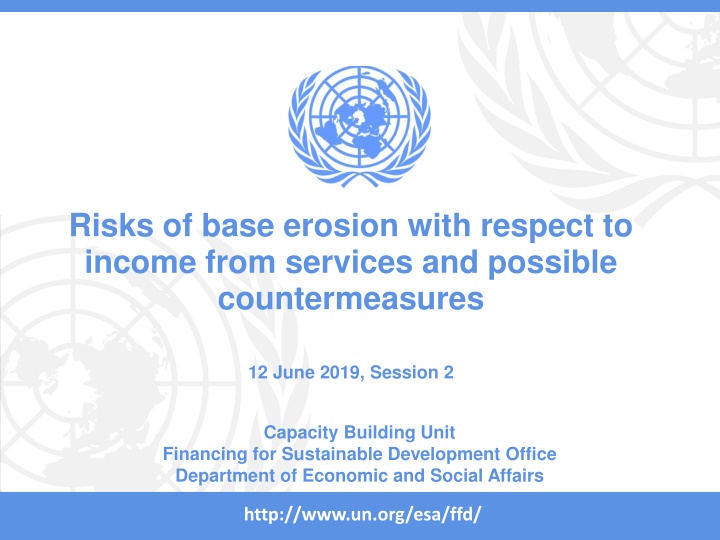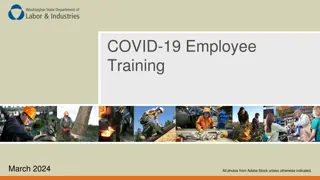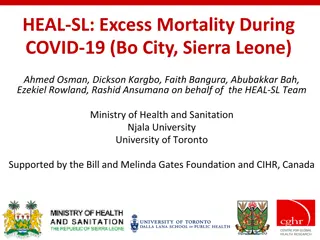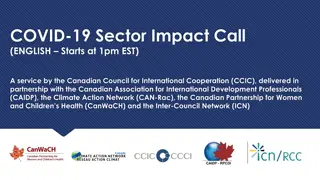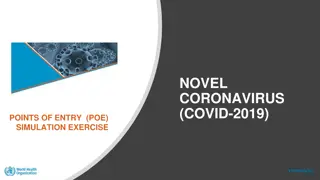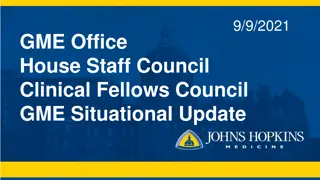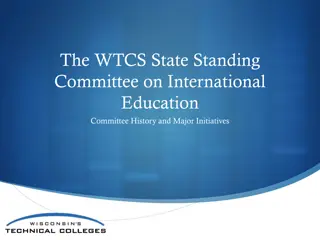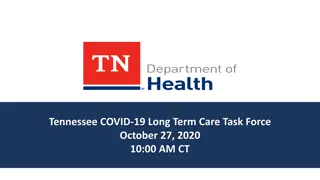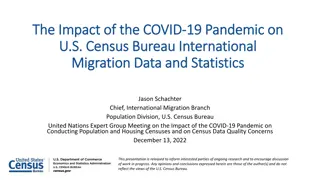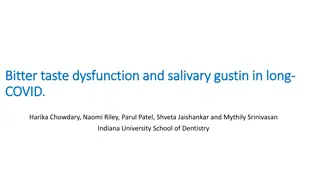Impact of COVID-19 on International Education
This content explores the significant impact of COVID-19 on international education, highlighting challenges faced by institutions like Rutgers University and the measures taken to support students through virtual programs. The pandemic has disrupted international enrollment, study abroad initiatives, and academic success, necessitating innovative responses to mitigate the effects. Explore the strategies implemented to address the diverse challenges presented by the global health crisis and foster international educational engagement.
Download Presentation

Please find below an Image/Link to download the presentation.
The content on the website is provided AS IS for your information and personal use only. It may not be sold, licensed, or shared on other websites without obtaining consent from the author.If you encounter any issues during the download, it is possible that the publisher has removed the file from their server.
You are allowed to download the files provided on this website for personal or commercial use, subject to the condition that they are used lawfully. All files are the property of their respective owners.
The content on the website is provided AS IS for your information and personal use only. It may not be sold, licensed, or shared on other websites without obtaining consent from the author.
E N D
Presentation Transcript
Risks of base erosion with respect to income from services and possible countermeasures 12 June 2019, Session 2 Capacity Building Unit Financing for Sustainable Development Office Department of Economic and Social Affairs http://www.un.org/esa/ffd/
Risks of Base Erosion: Overview Risks with respect to 1) residents earning income from foreign services 2) non-residents earning income from services Risks vary depending on the type of services Risks are greater with respect to related-party transactions Risks must be assessed from the perspective of each country s tax system 2
Risks of Base Erosion: Overview Major factors in identifying and assessing the risks of base erosion with respect to services: What income from services does your country not tax? Or tax at a low rate? What payments for services are deductible? How does the country in which the non-resident service provider is resident tax the payments? What limitations do your country s tax treaties impose on taxation of income from services? Related-party service transactions 3
Risks of Base Erosion: Employment Residents earning income from foreign employment services Major risk is that such income is not taxable under a territorial system Solution: impose tax on worldwide employment income, or at least ensure that expenses are not deductible Also ensure that limitation on foreign tax credit works properly 4
Risks of Base Erosion: Employment Major risks of base erosion with respect to non-residents earning income from employment: 1) Tax under domestic law if non-resident employee is employed by a non-resident with a PE or fixed base in your country? Salary will be deductible Impose obligation to withhold tax on non-resident employer 5
Risks of Base Erosion: Employment 2) Tax under domestic law if non-resident employee is employed by a non-resident carrying on business in your country? If not, non-residents may try to avoid PE or fixed base through commissionaire arrangements, moving activities to different locations, having activities performed by related entities 6
Risks of Base Erosion: Employment 3) Art. 15(2) will prevent your country from taxing non-resident employees where non- resident employer avoids having PE or fixed base in your country Employer can avoid having a PE or fixed base through various artificial means Solution: anti-avoidance rules in domestic law and treaties (see changes to Model treaties pursuant to OECD BEPS Action 7) 7
Risks of Base Erosion: Employment 4) Legal relationship of employment altered to independent contractor Threshold for taxation of independent contractors (PE or fixed base) is much higher than for employees Solution: employment relationship for domestic law and treaty should be determined on the basis of its substance (see UN Commentary on Art. 15, quoting paras. 8.1-8.28 of the OECD Commentary) 8
Risks of Base Erosion: Employment 5) Non-resident entity hires out employees to residents of your country; therefore, employer is non-resident instead of resident Your country may not be able to tax under domestic law or treaty if non-resident employer does not have PE or fixed base in your country Solution: domestic anti-avoidance rules that apply for purposes of your tax treaties or treaty anti-abuse rule 9
Risks of Base Erosion: Employment 6) Fees paid to non-resident directors and remuneration of non-resident managers of resident companies Amounts will be deductible against your country s tax base Solution: amounts should be subject to withholding tax Also, treaties should contain Art. 16 of UN Model (Art. 16 of OECD Model applies only to directors) 10
Risks of Base Erosion: Employment 7) Amounts paid by your government to non- resident employees Amounts paid reduce government revenues Solution: amounts paid should be subject to withholding tax irrespective of where the services are performed Also, treaties should contain Art. 19 (note that Art. 19 does not apply to independent contractors) 11
Risks of Base Erosion: Employment 8) Pensions paid to non-resident former employees Amounts paid or prior contributions may be deductible against your country s tax base Solution: pension payments should be subject to withholding tax Also, treaties should contain Art. 18 (alternative B) of UN Model 12
Risks of Base Erosion: Entertainers and Athletes Some entertainers and athletes can make substantial amounts in a short time Solution: your country should tax all income (or income above a threshold) from entertainment and sports activities performed in your country Also, treaties should contain Art. 17 13
Risks of Base Erosion: Entertainers and Athletes Non-resident entertainers and athletes may attempt to avoid tax by assigning income to another person (e.g., controlled company) Solution: domestic law should impose tax on income irrespective of who receives it Also, treaties should contain Art. 17(2) 14
Risks of Base Erosion: Independent Personal Services Non-resident service providers may not be subject to tax under your domestic law unless they have a PE or fixed base or spend a minimum amount of time in your country Amounts paid may be deductible Solution: impose withholding tax on all payments for services (or services performed in your country) by non-residents, or deny deduction of such payments 15
Risks of Base Erosion: Independent Personal Services Also, any treaties with Art. 7 or 14 will limit your country s tax on payments to non- resident service providers Solution: do not enter into treaties or negotiate treaties with a shorter time threshold in Art. 14 (e.g., 90 or 120 days) 16
Risks of Base Erosion: Independent Personal Services Amounts paid by residents and non-residents with PE or fixed base in your country to non-resident service providers for services performed outside your country will be deductible Solution: impose withholding tax or deny deduction (e.g., tax on fees for technical services) Also, treaties must have special provisions to allow such withholding tax Note new Article 12A in UN Model on fees for technical services 17
Risks of Base Erosion: Other Business Services Non-resident service providers may not be subject to tax under your domestic law unless they have a PE Amounts paid may be deductible Solution: impose withholding tax on all payments for services (or services performed in your country) by non-residents, or deny deduction of such payments 18
Risks of Base Erosion: Other Business Services Also, any treaties with Art. 7 will limit your country s tax on payments to non-resident service providers Solution: do not enter into treaties or negotiate treaties with a shorter time threshold in Art. 5(3)(b) (e.g., 90 or 120 days) Eliminate same or connected project requirement Note: same or connected project requirement was eliminated from UN Model in 2017 19
Risks of Base Erosion: Other Business Services If non-resident service providers are subject to tax only if they have a PE in your country, they may avoid having a PE in various ways Solution: ensure that your domestic law and treaties contain anti-avoidance rules to prevent this type of tax avoidance Note changes to Article 5 of the UN Model pursuant to BEPS Action 7 20
21 BEPS Action 7 Measures Article 5(4) limited to activities that are preparatory or auxiliary considered separately or together New Article 5(4.1) anti-fragmentation rule: Exception in Article 5(4) does not apply if enterprise or closely related enterprise has a fixed place of business PE in the country or if overall activity is not preparatory or auxiliary as long as business activities are complementary functions of a cohesive business operation 21
22 BEPS Action 7 Measures Revised Article 5(5) with respect to dependent agents: Includes agent who habitually concludes contracts or plays principal role leading to conclusion of contacts for services without material modification by the principal Article 5(5) does not apply to independent agents as defined in Article 5(6) Article 5(6) is revised to exclude an agent who acts exclusively or almost exclusively for a closely related person 22
23 BEPS Action 6 Measures The general anti-abuse rule (Art.29(9)) added to the UN Model in 2017 may also be effective in preventing avoidance of PE status For example, new PPT (one of the principal purposes test) should prevent contract-splitting arrangements to avoid construction site PE rule Commentary on Article 5 (para. 9 quoting OECD Commentary para. 52) provides a specific anti- avoidance for countries that prefer a specific rule 23
24 Risks of Base Erosion: Other Business Services Amounts paid by residents and nonresidents with PE in your country to nonresident service provider for services performed outside your country will be deductible Solution: impose withholding tax or deny deduction (e.g., tax on fees for technical services) Also, treaties must have special provisions to allow such withholding tax Note new Article 12A in UN Model on fees for technical services 24
25 Risks of Base Erosion: Other Business Services If services are provided by a nonresident related to the payer, the payments may be deductible against your country s tax base Also, there is a risk that the amounts paid may be more or less than the arm s length price of the services Solution: your domestic law should contain robust transfer pricing rules that are enforced rigorously 25
26 Risks of Base Erosion: Insurance If your domestic law imposes tax on insurance companies only if they do business through a PE in your country, they may be able to avoid having a PE Solution: impose tax if nonresident company collects premiums or insures risks in your country Also, treaties should contain Art. 5(6) of UN Model 26
27 Risks of Base Erosion: Construction If your domestic law imposes tax on nonresidents engaged in construction activities in your country only if they have a PE in your country or spend a minimum time there, they may be able to avoid tax Amounts paid for construction will be deductible Solution: impose tax on all income derived by nonresidents from construction activities in your country 27
28 Risks of Base Erosion: Construction Treaties containing Art. 5(3)(a) of the UN Model will prevent your country from taxing unless construction lasts for at least 6 months and Article 5(1) is satisfied Solution: do not enter into treaties or negotiate a shorter time threshold (e.g., 3 months) and allow construction activities at different locations in your country to be aggregated 28
29 Key Risks of Base Erosion 1) Employment Nonresidents working for a PE or fixed base of a nonresident employer Nonresidents who are legally employed by nonresident but in substance by resident Nonresidents who are legally independent contractors but in substance employees 2) Entertainers and athletes who earn substantial amounts from activities in your country 29
30 Key Risks of Base Erosion 3) Independent personal services performed in your country by nonresidents without having a PE or fixed base, especially if PE or fixed base is artificially avoided Deductible payments to nonresidents for services performed outside your country Cross-border related party services 30
31 Key Risks of Base Erosion 4) Other business services Performed in your country by nonresidents without having a PE, especially if PE is artificially avoided Deductible payments to nonresidents for services performed outside your country Cross-border related-party services 31
Thank you TaxffdCapDev@un.org 32 http://www.un.org/esa/ffd/
